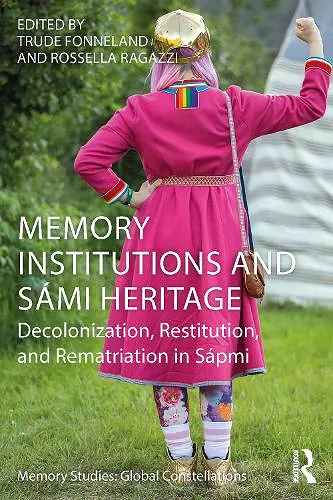Memory Institutions and Sámi Heritage
Decolonization, Restitution, and Rematriation in Sápmi
Rossella Ragazzi editor Trude Fonneland editor
Format:Paperback
Publisher:Taylor & Francis Ltd
Published:9th Dec '24
Should be back in stock very soon

With a focus on Sápmi – the transcultural and transnational homeland of the Sámi people – this book presents case studies and theoretical frameworks which explore the ways in which memory institutions such as museums, archives, and festivals participate in and guide processes of appropriation, decolonization, and memory-making.
The destruction and concealment of Sámi objects in both private and museum collections worldwide have impacted Sámi knowledge systems, disrupting local ways of knowing. Appreciation and reappropriation are important acts of decolonization which seek to create openings for reconnection to traditions, languages, and practices that were forcibly suppressed in the past. Western memory institutions such as museums, archives, and galleries have had a great impact on how heritage has been collected, stored, conserved, and organized within closed walls and glass cases. As the new museology movement developed in the 1990s, numerous examples revealed how difficult it became for researchers and public alike to access heritage. Considering the proliferation of cultural interventions and the growth of Sámi mobilization, which calls into question assumptions about how best to activate and experience Sámi cultural heritage and what constitutes appropriate stewardship, this book sheds light on initiatives to return artefacts to the Sámi community. With particular attention to the ways in which Sámi self-determination and the shifting boundaries between Indigenous and settler identities are articulated, challenged, and renegotiated, it draws on approaches from critical museology and Indigenous methodologies to explore the initiation, experience, and operationalizing of restitution projects.
This book will therefore appeal to scholars of cultural studies, anthropology, sociology, and museum and heritage studies, as well as to those interested in questions of repatriation, restitution, and healing processes.
The Open Access version of this book, available at http://www.taylorfrancis.com, has been made available under a Creative Commons [Attribution-Non Commercial-No Derivatives (CC-BY-NC-ND)] 4.0 license.
"Memory Institutions and Sámi Heritage addresses the timely topic of how museums, archives, galleries, festivals, etc. deal with their colonial legacy and with an urgent need to revise their role, position, and perceptions on cultural heritage. This volume is an invaluable contribution to the ongoing work of understanding the consequences and implications of the decolonial turn for memory institutions in Sápmi and in other Indigenous contexts."
Coppélie Cocq, Professor in Sámi Studies and Digital Humanities and Assistant Director of Humlab, Umeå University, Sweden
"This is a collection of well-researched case studies hitting the very core of heritage theory by its explorations of the intrinsic power relations and colonial aspects of museum work. Applying these perspectives to Sámi culture has a double advantage. It gives insights into Sámi cultural expressions as they have moved and been moved from everyday life into museums and other memory institutions, driven by different agendas and agents. Doing so, it also demonstrates the ontological implications of phenomena like restitution, decolonization, and repatriation (or rematriation, referring critically to the gendered concepts of nation and fatherland). At the same time, the book is an important contribution to memory and museum studies more generally, showing the conceptual complexities as well as the practical challenges that follow from shifting the focus from artifacts to agents or from heritage to heirs to autonomous Sámi agency."
Anne Eriksen, Professor of Cultural History, IKOS, University of Oslo, Norway
"I recommend this book highly for its enlightening presentation of new and thought-provoking perspectives on past and contemporary presentations of Indigenous Sámi culture in memory institutions and beyond. Understood as ongoing processes of change in a decolonizing perspective, the contexts of the analyzed examples range from museums to festivals, music, art, and tourism. Where earlier power imbalances caused appropriation and misrepresentations of their culture, today’s presenters have to establish new communicative positions and new ways of cooperating with Indigenous groups. To readers involved in any presentations of Sámi heritage the book would be inspirational, and would bring greater understanding to the general, interested audience."
Stein R. Mathisen, Professor Emeritus, Department of Tourism & Northern Studies, UiT The Arctic University of Norway, Norway
"One of the most striking features of this insightful collection of essays is the importance accorded to introducing, explaining and applying Sámi terminology, concepts, and epistemologies as tools to understand historical and contemporary dynamics pertaining to Sámi memory and cultural heritage. This approach not only imparts meaning and substance to the processes of Sámi decolonization and (re)appropriation, but also discloses new, exciting theoretical, methodological, and practice-based perspectives on the work of museums and memory institutions in a postcolonial world – in Sámi, Indigenous, and non-Indigenous contexts alike."
Marzia Varutti, Marie Skłodowska-Curie research fellow, Swiss Center for Affective Sciences, University of Geneva, Switzerland
ISBN: 9781032547190
Dimensions: unknown
Weight: 440g
264 pages